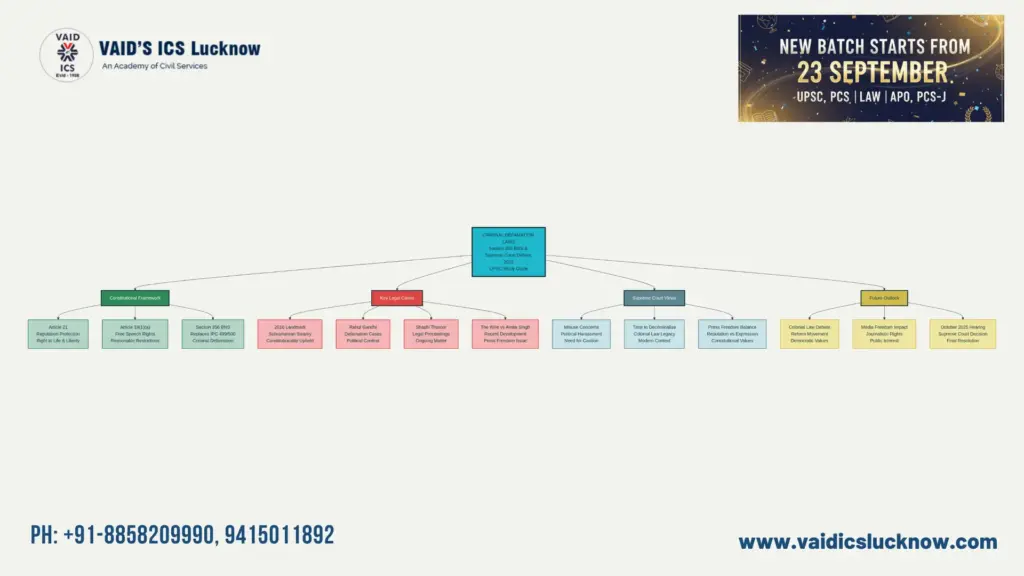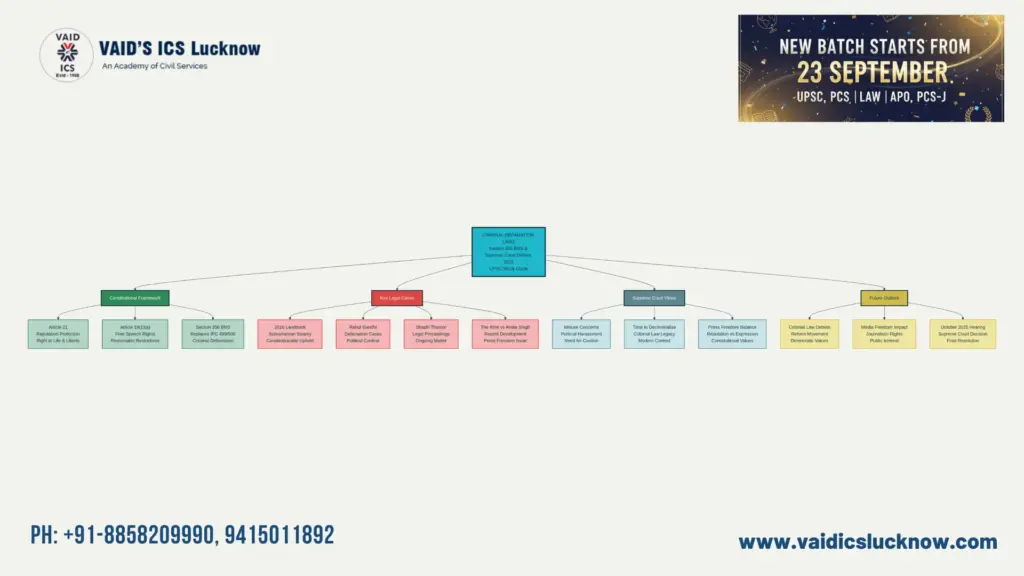September 23, 2025
Criminal Defamation Laws | Section 356 BNS
Recently , a Supreme Court bench led by Justice M.M. Sundresh expressed exasperation over the misuse of criminal defamation laws by private individuals and political parties to settle scores, remarking that “time has come to decriminalise” such provisions. This oral observation came while hearing a petition by The Wire news portal to quash summons in a 2016 defamation case filed by former JNU professor Amita Singh, reopening debates from the 2016 Subramanian Swamy vs Union of India judgment that upheld the law’s validity as a reasonable restriction on free speech under Article 19(1)(a).
Judicial Frustration with Misuse: Justice Sundresh highlighted the law’s ramped-up use for personal vendettas, questioning if private defamation qualifies as a “crime” without public interest, echoing concerns from the 2016 ruling.
Case Background: The petition challenges summons over a 2016 article titled “Dossier Call JNU ‘Den of Organised Sex Racket’; Students, Professors Allege Hate Campaign,” alleging Singh’s role in a controversial dossier; Delhi HC quashed initial summons in 2023, but SC remanded in 2024, leading to fresh issuance upheld in May 2025.
Broader Trend: The bench stayed proceedings and tagged the case with Rahul Gandhi’s pending defamation petitions, amid recent SC stays in cases against Gandhi (for instance, statements concerning Amit Shah, V.D. Savarkar, the Bharat Jodo Yatra) and Shashi Tharoor’s remark comparing it to a ‘scorpion on a Shivling’.
Historical Context: In 2016 Subramanian Swamy case, SC upheld Sections 499/500 IPC (now Section 356 BNS) as protecting reputation under Article 21, but cautioned against harassment; recent benches have criticized it as a tool for “political scores.”
Implications: The remark signals potential rethink on colonial-era laws amid press freedom concerns; Senior Advocate Kapil Sibal agreed, citing Gandhi’s repeated appeals, with hearing posted for October 2025.

Definition of Defamation:
Defamation involves making statements that lower a person’s reputation in society or expose them to public hatred, contempt, or ridicule.
Means of Defamation:
Defamation can be committed through:
Intent or Knowledge:
A critical element is mens rea (intent or knowledge). The act qualifies as defamation if it is done:
Punishment:
The penalties prescribed under Section 356 BNS include:
Exceptions:
| Topics based Judiciary (PCS J) Mains Questions: 200 words Qn.“Section 356 of the Bharatiya Nyaya Sanhita (BNS), which deals with criminal defamation, has been subject to judicial scrutiny, with the Supreme Court recently questioning its misuse for private and political vendettas. In light of this, critically examine the need for decriminalising defamation in India. Discuss the balance between protecting reputation under Article 21 and ensuring freedom of speech under Article 19(1)(a).”Approach for Answer:
|

हाल ही में, न्यायमूर्ति एम.एम. सुंदरेश की अगुवाई वाली सुप्रीम कोर्ट की बेंच ने निजी व्यक्तियों और राजनीतिक दलों द्वारा आपराधिक मानहानि कानूनों के दुरुपयोग पर अपनी नाराजगी व्यक्त की। उन्होंने कहा कि “समय आ गया है कि इन प्रावधानों को अपराध से हटाया जाए।” यह टिप्पणी तब आई जब कोर्ट ने द वायर न्यूज़ पोर्टल द्वारा 2016 में दायर एक मानहानि मामले में समन रद्द करने की याचिका सुनी। यह मामला पूर्व JNU प्रोफेसर अमित सिंह द्वारा दायर किया गया था और 2016 के सुब्रमण्यम स्वामी बनाम भारत संघ निर्णय को फिर से जीवित कर दिया, जिसमें कानून को अनुच्छेद 19(1)(a) के तहत अभिव्यक्ति की स्वतंत्रता पर उचित प्रतिबंध के रूप में वैध ठहराया गया था।
न्यायिक असंतोष और दुरुपयोग:
न्यायमूर्ति सुंदरेश ने इस कानून के निजी प्रतिशोध के लिए बढ़ते उपयोग को उजागर किया। उन्होंने सवाल उठाया कि क्या निजी मानहानि को “अपराध” माना जा सकता है, जब इसमें सार्वजनिक हित नहीं हो।
मामले का पृष्ठभूमि:
याचिका 2016 में प्रकाशित एक लेख पर आधारित है – “Dossier Call JNU ‘Den of Organised Sex Racket’; Students, Professors Allege Hate Campaign”, जिसमें अमित सिंह की भूमिका विवादास्पद डोसिएर में बताई गई।
व्यापक प्रवृत्ति:
बेंच ने सुनवाई स्थगित की और मामले को राहुल गांधी के लंबित मानहानि मामलों के साथ जोड़ा। हाल के वर्षों में सुप्रीम कोर्ट ने गांधी और शशि थरूर के मामलों में भी स्थगन आदेश दिए हैं।
ऐतिहासिक संदर्भ:
निहितार्थ:
यह टिप्पणी औपनिवेशिक युग के कानूनों की समीक्षा की संभावनाओं को दर्शाती है, विशेषकर पत्रकारिता और अभिव्यक्ति की स्वतंत्रता के संदर्भ में।
मानहानि की परिभाषा:
किसी व्यक्ति की प्रतिष्ठा को समाज में नीचा दिखाने या उसे जन निंदा, अवमानना या तिरस्कार के अधीन करने वाले कथन मानहानि माने जाते हैं।
मानहानि के साधन:
इरादा या ज्ञान (Mens Rea):
यह आवश्यक है कि कार्य प्रतिष्ठा को हानि पहुँचाने के इरादे से या हानी पहुँचने की संभावना जानते हुए किया गया हो।
सजा:
अपवाद:
सारांश:
धारा 356 BNS आपराधिक मानहानि के खिलाफ कानूनी ढांचे को मजबूत करती है।
| विषयाधारित न्यायपालिका (पीसीएस जे) मुख्य परीक्षा प्रश्न: 200 शब्द
प्रश्न: उत्तर देने का तरीका:
|
B-36, Sector-C Aliganj – Near Aliganj Post Office Lucknow – 226024 (U.P.) India
+91 8858209990, +91 9415011892
lucknowvaidsics@gmail.com / drpmtripathi.lucknow@gmail.com
About Us
VAIDS ICS Lucknow, a leading Consultancy for Civil Services & Judicial Services, was started in 1988 to provide expert guidance, consultancy, and counseling to aspirants for a career in Civil Services & Judicial Services.
The Civil Services (including the PCS) and the PCS (J) attract some of the best talented young persons in our country. The sheer diversity of work and it’s nature, the opportunity to serve the country and be directly involved in nation-building, makes the bureaucracy the envy of both-the serious and the adventurous. Its multi-tiered (Prelims, Mains & Interview) examination is one of the most stringent selection procedures. VAID’S ICS Lucknow, from its inception, has concentrated on the requirements of the civil services aspirants. The Institute expects, and helps in single-minded dedication and preparation.
© 2023, VAID ICS. All rights reserved. Designed by SoftFixer.com